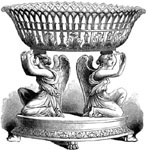
The Christian Gifts of J.R.R. Tolkien
NOT A HIPPIE CULT FIGURE
As the world moves away from history’s bloodiest century, Catholic author and scholar J.R.R. Tolkien seems to be finally receiving the recognition he has so long deserved. A comprehensive 1997 British poll ranked The Lord of the Rings as the greatest book of the century. A 1999 Amazon.com poll took this even further, rating The Lord of the Rings as the greatest book of the millennium, and Amazon.com customers honored Tolkien with the title “Author of the Millennium.”
As one might imagine, the literati have not been pleased. “Tolkien — that’s for children, isn’t it?” wrote one British critic, adding, “It just shows the folly of these polls, the folly of teaching people to read.” English reviewer Andrew Rissik dismissed Tolkien’s relevance: “After the annihilating traumas of the last century, it’s merely perverse to ascribe greatness to this airy but strangely simplified mock-Teutonic never-never land.”
The British are not alone in their criticism. Famed American literature professor Harold Bloom contended that The Lord of the Rings is simply a period piece that “met a need in the early days of the Counter-Culture.” That is, Tolkien’s Middle-earth provided one of the many escapist fads for the hippies of the 1960s and early 1970s. They desired escape by any means necessary: drugs, music, or Tolkien. Further, Bloom asserted, the protagonist of the story, Frodo, is not a hero, and his sage companion, Gandalf, is “self-important” and rude.
Whatever one thinks of Tolkien’s heroes or his writing style, one cannot objectively dismiss Tolkien as merely a cult figure. Tolkien clearly remains popular, despite his critics, and well beyond the hordes of “sword and sorcery” enthusiasts and hippie-era drug-culture types.
You May Also Enjoy
It was from her 17-year experience in Africa that Karen Blixen, under the pen name of Isak Dinesen, wrote her highly acclaimed stories of Africa.
A film entitled The Spitfire Grill has just been released. We have a fascinating insight…
Director Alexander Payne has crafted a rare and beautiful film that treats virtue, sacrifice, forgiveness, and fatherhood with respect.

